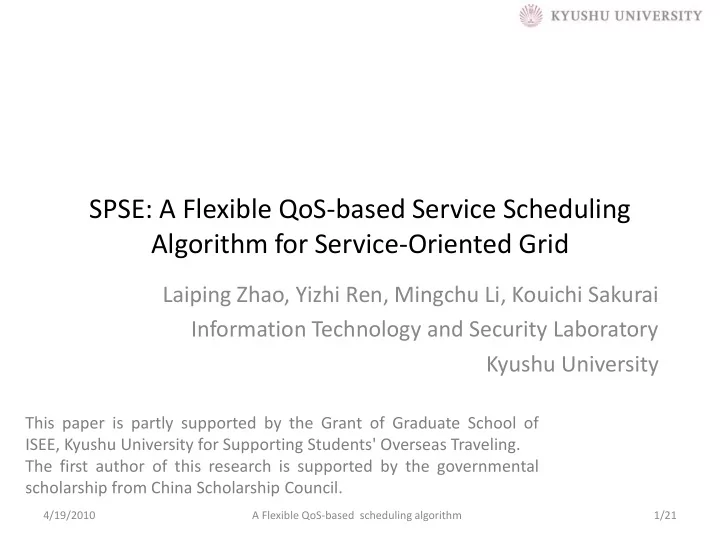

SPSE: A Flexible QoS-based Service Scheduling Algorithm for Service-Oriented Grid Laiping Zhao, Yizhi Ren, Mingchu Li, Kouichi Sakurai Information Technology and Security Laboratory Kyushu University This paper is partly supported by the Grant of Graduate School of ISEE, Kyushu University for Supporting Students' Overseas Traveling. The first author of this research is supported by the governmental scholarship from China Scholarship Council. 4/19/2010 A Flexible QoS-based scheduling algorithm 1/21
Outline • 1. Introduction • 2. QoS-based scheduling algorithm – 2.1 SPSE description – 2.2 Filter operation – 2.3 Rank operation – 2.4 Update the preferences • 3. Analysis & Experiments • 4. Conclusion and future works 4/19/2010 A Flexible User-centric scheduling algorithm 2/21
1. Introduction Motivation: I don’t care much about the price, I need my job completed earlier. Service-oriented Grid I don’t care much about the Users time, I like cheaper service. Which service is the most appropriate? 4/19/2010 A Flexible User-centric scheduling algorithm 3/21
1. Introduction • Problem: – Multi-objective supported? • Price? Time? Reliability? Trust?... – User personalization? • Different people have different preferences. • We seek a QoS-based service schedule algorithm , which supports multi-objective and user personalization. 4/19/2010 A Flexible User-centric scheduling algorithm 4/21
2. SPSE algorithm • Service provider search engine (SPSE) Cheaper services Service Oriented Grid Faster services Users 4/19/2010 A Flexible User-centric scheduling algorithm 5/21
2. SPSE algorithm • Job model: • Service model: – cpu , price , trust , reliability are the criteria. • Service-oriented Grid environment: – There are many different kinds of services on the Internet. (The service_type indicates this.) – For each service, there are many service providers. – Web services from different organizations providing the same type of service come with the unified same interfaces. 4/19/2010 A Flexible User-centric scheduling algorithm 6/21
2. SPSE algorithm The service scheduling middleware 4/19/2010 A Flexible User-centric scheduling algorithm 7/21
2. SPSE algorithm • The Service Provider Search Engine (SPSE). SPSE Algorithm Search Filter Rank Update 4/19/2010 A Flexible User-centric scheduling algorithm 8
2. SPSE algorithm • Operations in the algorithm: – Search : • Searches service providers from Grid information services (GIS) according to the service_type . – Filter • Deletes the poor service providers from all candidates. – Rank • Let better candidates rank higher than poorer candidates. – Update • User selects one candidate as the final choice, the user’s choice will be used to update user’s preferences. 4/19/2010 A Flexible User-centric scheduling algorithm 9/21
2.1 Filter operation Goal : Delete the poor service providers from all candidates. Example 1 : There exists 10 providers: A,B,C,D,E,F,G,H,I,J have different performance on time and economic cost. After the Pareto optimization based selection: A,D,G,B,C are left. 4/19/2010 A Flexible User-centric scheduling algorithm 10/21
2.1 Filter operation • The time minimization service provider ( cost minimization service provider, trust maximization service provider ) is not deleted by the filter operation. – ( Proof ) • Therefore, SPSE can be used for single objective scheduling . 4/19/2010 A Flexible User-centric scheduling algorithm 11
2.2 Rank operation • User preference: – A set of parameters: • m is the number of criteria. – Each parameter reflects how highly user values the corresponding criteria. • Attributes of user preferences: – Every user has a parameter set. – Initialization: – The values are updated every time after one scheduling. 4/19/2010 A Flexible User-centric scheduling algorithm 12/21
2.2 Rank operation Goal : Sort the service providers set into order. Example 2 : There exists 5 providers: S1, S2, S3, S4, S5. (1) Sort; (2) Calculate the final rank value; (3) Sort again. 4/19/2010 A Flexible User-centric scheduling algorithm 13/21
2.2 Rank operation • Using the struct: • We get: • Therefore, we get: S1 > S2 > S5 > S4 > S3 4/19/2010 A Flexible User-centric scheduling algorithm 14/21
2.3 Update the preferences • User select one provider from final set. • Update the preference value on time : Where is the execution time of user selected solution; is the is execution time of NO.1 solution; is the original preference value on time. Economic cost: Trust: Other criteria: 4/19/2010 A Flexible User-centric scheduling algorithm 15/21
2.3 Update the preferences • Update operation follows two rules: – – Reward principle: • Where is a threshold value, indicating how big changes to the user’s preferences. 4/19/2010 A Flexible User-centric scheduling algorithm 16/21
3. Analysis & Experiments Time complexity : Where M is the number of criteria, N is the number of service provider candidates. The scheduling time of SPSE with respect to different number of service providers 4/19/2010 A Flexible User-centric scheduling algorithm 17/21
3. Analysis & Experiments • Precision of preference values a: One person who prefers shorter time. b: One person who prefers less economic cost. c: One person who prefers higher provider’s trust. 4/19/2010 A Flexible User-centric scheduling algorithm 18/21
3. Analysis & Experiments • Precision of preference values If one person changed his preference: from time to cost, from cost to trust. 4/19/2010 A Flexible User-centric scheduling algorithm 19/21
3. Analysis & Experiments • Precision of solutions: After the first job submission, users’ preference value will be stable, if the job and Grid environment are not changed. 4/19/2010 A Flexible User-centric scheduling algorithm 20/21
4. Conclusion and future works • SPSE is the first algorithm on service search and scheduling: – Support the Multi-objective; – Support the User personalization. • Experiments show that the most preferred service provider by an end-user is captured precisely. • Future works: – The proposed SPSE is still simple, we ignore some issues like: fault tolerance, preemptible, which will be considered in our future work. 4/19/2010 A Flexible User-centric scheduling algorithm 21/21
• Thank you for your attention. • Questions? 4/19/2010 A Flexible User-centric scheduling algorithm 22/21
Recommend
More recommend